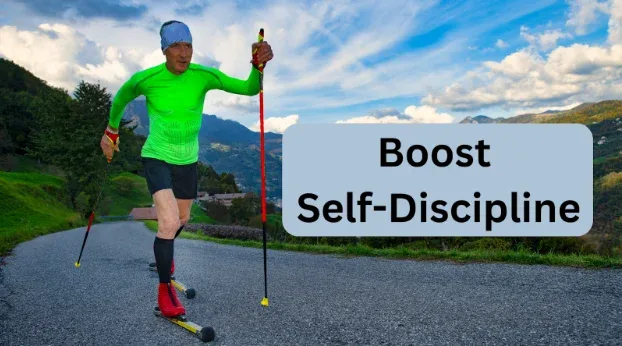If you could possess one characteristic to achieve excellence in your field, self-discipline may be at the top of the list.
Think about it … How many times have you tried to start (or stop) a new habit, but got derailed?
How much further ahead would you be if you had remained consistent in your efforts?
Self-discipline is the path to our potential and that’s why we dive into exactly what it is and how to improve it below.
Self-Discipline: Definition
First things first, what exactly is self-discipline?
Think of it as the ability to stay focused on your goals and maintain control over your actions, even when faced with distractions or temptations.
Self-discipline is that inner voice guiding you towards becoming the best version of yourself combined with the willingness to do what it takes.
Too often this is seen as ignoring feelings, being rigid, forcing yourself to do something and not caring about anything else.
That sounds more like self-coercion than self-discipline to me!
Self-discipline is much closer to keeping your goals in mind when negative thoughts and uncomfortable feelings arise.
Then intentionally making a choice to do what moves you forward, rather than give in and do what makes you feel better in the moment.
Imagine a scenario where you want to get fit and lead a healthier lifestyle.
Without self-discipline, you might find yourself skipping workouts, indulging in unhealthy treats, and making excuses for not taking action.
But when you cultivate self-discipline, you’ll find the strength to resist the allure of instant gratification, prioritize long-term goals, and make healthier choices consistently.
It is the power you need to conquer obstacles and achieve greatness.
Why Boost Your Self-Discipline?
Self-discipline is the key to unlocking your full potential and achieving your dreams.
When you develop self-discipline, you gain the power to:
Achieve Your Goals: Whether it’s landing your dream job, getting in shape, or learning a new skill, self-discipline will guide you towards success because it is only through action that these things can be achieved.
Build Healthy Habits: We all have those bad habits we’d like to get rid of.
Self-discipline helps you replace them with positive and constructive habits that improve your well-being.
So, whether it’s starting a morning meditation practice or adopting a regular exercise routine, self-discipline will empower you.
Boost Productivity: With self-discipline, you’ll become more focused and efficient, making it easier to tackle tasks and complete projects.
Instead of procrastinating or getting lost in distractions, you’ll channel your energy into productive endeavors, propelling you towards your aspirations.
Enhance Mental Strength: Resisting instant gratification and staying committed to your goals builds resilience and mental toughness.
You’ll become better equipped to handle challenges and setbacks, viewing them as opportunities for growth rather than roadblocks.
Improve Relationships: Self-disciplined individuals are more reliable, trustworthy, and better at managing their emotions, making them great friends, partners, and colleagues.
When you practice self-discipline, you cultivate emotional intelligence and create deeper connections with those around you.
We trust people who consistently do what they say they are going to do.
Where Self-Discipline Can Help You Improve
Now that we understand the self-discipline definition and benefits, let’s explore some areas of life where it can help you truly excel:
- Health and Fitness: It’s no secret that maintaining a healthy lifestyle requires discipline.
Whether it’s sticking to a regular exercise routine or resisting the temptation of unhealthy snacks, self-discipline is needed to take the correct action.
It helps you develop the willpower to make healthy choices consistently, leading to improved physical and mental well-being.
- Learning and Education: Whether you’re a student or a lifelong learner, self-discipline is crucial for staying focused during studies and acquiring new knowledge and skills.
It empowers you to prioritize learning, stay engaged in your studies, and excel in your academic pursuits.
- Career Advancement: Want that promotion at work?
Self-discipline will help you stay dedicated to your professional development and make you stand out among your peers.
By staying disciplined, you’ll demonstrate a strong work ethic, reliability, and a commitment to self-improvement.
- Time Management: Keeping track of time and using it wisely is essential in today’s fast-paced world.
Social media is the number one time distraction reported by my athletes.
Self-discipline will assist you in prioritizing tasks, avoiding time-wasting activities, and managing your time effectively.
You’ll become a master of productivity, accomplishing more in less time.
- Financial Management: Saving money, avoiding impulsive purchases, and sticking to a budget all require self-discipline to avoid falling into debt and achieve financial stability.
With self-discipline, you’ll make sound financial decisions rather than emotional ones, paving the way for a secure future.
Personal Benefits of Self-Discipline
You can expect personal, internal changes with the practice of self-discipline as well.
With consistent effort and dedication, here are a few remarkable changes to look for:
Achieving your goals and overcoming challenges will boost your confidence and give you a sense of accomplishment.
Each step forward will reinforce your belief in your abilities, motivating you to take on even bigger challenges.
You’ll find yourself more at peace with yourself, reducing stress and anxiety.
Self-discipline frees you from the guilt and regret that often accompany poor choices, allowing you to live with greater inner harmony.
When our behaviors are consistent with what is truly most important to us, inner peace is the natural result.
When faced with setbacks, self-discipline will help you bounce back and keep pushing forward.
You’ll develop the mental resilience to persevere through difficulties, knowing that obstacles are temporary roadblocks on your path to success.
As part of your self-discipline practice, you rehearse acting consistent with your values while inconsistent with how you feel.
Resilience is built with each repetition.
Distractions won’t have as much power over you, and you’ll be able to concentrate better on what truly matters.
With self-discipline, you’ll stay focused on your priorities, making the most of your time and energy.
Your commitment and perseverance will inspire those around you to adopt healthier habits and work towards their goals.
As you lead by example, others will recognize the positive impact of self-discipline and seek to emulate it in their lives.
How To Boost Your Self-Discipline
Self-discipline is not an all or nothing experience, and it won’t show up overnight once you decide to pursue it.
Give yourself time to improve it slowly and deliberately.
Expect failure as part of the learning process.
Here are some practical tips to get you started:
- Set Clear Goals: Know what you want to achieve and break your goals into smaller, manageable steps.
Goals should be specific behaviors that are under your control so that at the end of the day you can clearly see if they were accomplished or not.
For example, “3 sets of 25 push-ups each morning before work” rather than “exercise more.”
- Create a Routine: Establish a daily or weekly routine that aligns with your goals and stick to it.
Consistency breeds discipline, and having a structured routine can help you stay on track even during challenging times.
One way to start a new habit is to tie it into an existing one.
For example, many of my athletes brush their teeth every night.
They choose to start a mindfulness practice right after they put down their toothbrush before they do anything else.
In this way their new mindfulness routine builds on the consistency of their established teeth brushing habit.
- Practice Mindfulness: Being aware of your thoughts and impulses will help you gain better control over your actions and reactions.
Mindfulness allows you to pause and assess whether a particular action aligns with your long-term goals before acting on it.
- Eliminate Temptations: This is a big one! Identify the distractions and temptations that hinder your progress, and take steps to minimize their presence in your environment.
For instance, if you’re trying to cut down on social media, consider uninstalling certain apps from your phone or using website blockers during designated work hours. …
I can feel your resistance!
Eliminating temptations is a practice of self-discipline in and of itself.
Take a moment and ask in absolute terms, do I want to be successful in this new behavior?
Yes or no?
(Not “yes, but …”)?
You are at a choice point.
If you want to succeed, eliminate the temptations.
If you aren’t committed, keep the temptation and know you are setting yourself up to fail.
And don’t beat yourself up for this.
Own your choice.
We have many valid reasons for why we do things, even the things that aren’t helpful towards goals.
They make us feel better in the moment.
If you struggle here, you may benefit from additional training on how to best respond to difficult emotions.
- Reward Yourself: Celebrate your successes, no matter how small.
Rewarding yourself for staying disciplined will reinforce positive behavior and create positive associations with your efforts.
Too often we skip this thinking, “I’m just doing what I should or need to do.”
This is a motivation killer!
We want to reward ourselves (and others) when we do something right to increase the chances of doing it again.
However, ensure that the rewards are in line with your goals and don’t contradict your progress (for example, staying up late to binge TV because you’ve gotten great sleep for 2 weeks).
- Track Your Progress: Keeping track of your efforts and achievements can be incredibly motivating.
Consider maintaining a journal or using apps to track your progress, and reflect on how far you’ve come whenever you face challenges.
- Practice Delayed Gratification: One of the cornerstones of self-discipline is learning to delay gratification.
Whenever you feel an urge to indulge in instant gratification, pause and notice it as a bodily sensation.
Again, this is a choice point.
Remind yourself of the long-term benefits of staying disciplined and how you might feel soon after the pleasure of giving in.
Might you consider the discomfort of delaying gratification a positive sign of moving toward your goals and willingly feel it?
- Build a Support System: Surround yourself with individuals who support your goals and encourage your self-discipline journey.
Even better, ensure your social circle shares your values and goals for a community of consistent messaging and support.
Having a reliable support system can provide you with accountability and motivation during difficult times.
The Greatest Challenges and How to Overcome Them
Now, let’s face it – self-discipline is much easier said than done.
And this is the first obstacle to overcome, the hard work of developing it.
Be willing to feel the discomfort in service of your goal.
Your pain has meaning.
There are challenges along the way and we have solutions:
Procrastination: Ah, the nemesis of productivity.
Combat procrastination by setting deadlines and using accountability methods like telling a friend or using apps to track progress.
Break your tasks into smaller, manageable parts, and start with the most straightforward one to build momentum.
Lack of Motivation: We all experience moments of low motivation.
If it works, you can remind yourself of your long-term goals, visualize the rewards of staying disciplined, or seek inspiration from books, podcasts, and success stories to reignite your drive.
But if it doesn’t, a better approach is to give up the struggle to change your feelings.
You can act independent of how you feel.
Give up the rule that you need to be motivated to take action. You don’t.
Overwhelming Temptations: When faced with strong temptations, just sit.
Notice the temptation and feel how impulsive you want to be.
Invest your energy into noticing the feeling, then noticing your surroundings – what you might see or hear.
You don’t have to do the right thing right now.
Just sitting and not doing the unhelpful thing is a great step forward.
Fear of Failure: Failure is a natural part of the learning process.
Embrace failures as opportunities to learn and grow.
Remind yourself that failure is not a reflection of your worth, but rather a stepping stone towards improvement.
Perfectionism: Striving for perfection can be a roadblock to progress.
Recognize that nobody is perfect, and occasional mistakes are part of the learning process.
Embrace a growth mindset, where you view challenges as opportunities for growth rather than a reflection of your abilities.
Conclusion
In conclusion, by cultivating self-discipline, we can achieve our goals, build positive habits, and lead fulfilling lives.
Remember, it takes time and we will make mistakes, so be patient and kind to yourself along the way.
Embrace the power of self-discipline and you’ll discover your extraordinary potential within.



